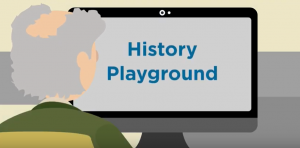
ΑΙhub.org
History playground – finding patterns in historical newspapers
 Ever fancied finding out more about historical trends? Well, thanks to researchers at the University of Bristol, and their History Playground tool, anyone can analyse the content from a collection of historical British and American newspapers.
Ever fancied finding out more about historical trends? Well, thanks to researchers at the University of Bristol, and their History Playground tool, anyone can analyse the content from a collection of historical British and American newspapers.
Macroscopic patterns of continuity and change over the course of centuries can be detected through the analysis of time series extracted from massive textual corpora. Similar data-driven approaches have already revolutionised the natural sciences. It is widely believed that there is similar potential for the humanities and social sciences. As such, new interactive tools are required to discover and extract macroscopic patterns from these vast quantities of data.
History Playground enables users to search for small sequences of words and retrieve their relative frequencies over the course of history. The tool makes use of scalable algorithms to first extract trends from textual corpora, before making them available for real-time search and discovery, presenting users with an interface to explore the data.
At present there are two large sets of text available:
- News articles from local British periodicals and newspapers from between 1800 and 1950 from the FindMyPast British Newspaper Archive.
- News articles from American newspapers published between 1836 and 1922 from the Chronicling American project.
Find out how to start using the History Playground by watching this short video:
Watch a further introduction to the project here:
History Playground uses the concept of n-grams, defined as short sequences of words. It is these n-grams that users search for when they use the tool. N-gram models are also widely used in the fields of natural language processing, probability, communication theory and data compression.
The team hope that in the long term, as more large textual datasets are released and additional feedback from the community helps to improve the Playground, they will be able to incorporate more varied and interesting corpora into the tool. In addition they are continuing to develop methods of analysis and additional views and visualisations. The tool also has the potential to incorporate text in languages other than English. For looking at more contemporary sources of data (for example, social media) the time resolution can be adjusted to study daily or even hourly changes.
This work is part of the ERC ThinkBIG project, Principal Investigator Nello Cristianini, University of Bristol.

Nello Cristianini is a Professor of Artificial Intelligence at the University of Bristol. His research interests include data science, artificial intelligence, machine learning, and applications to computational social sciences, digital humanities and news content analysis.
Read the full research articles on this topic:
- Lansdall-Welfare, T & Cristianini, N 2019, History Playground: A Tool for Discovering Temporal Trends in Massive Textual Corpora, Digital Scholarship in the Humanities. The arXiv version can be found here.
- Lansdall-Welfare, T., Sudhahar, S., Thompson, J., Lewis, J., The FindMyPast Newspaper Team & Cristianini, N. 2017, Content Analysis of 150 Years of British Periodicals Proceedings of the National Academy of Sciences of the United States of America 114 (4) E457-E465.










